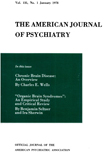THE EFFECTS OF METHYLPHENIDATE ON SYMPTOMATOLOGy AND LEARNING IN DISTURBED CHILDREN
Abstract
This study investigated the effects of methylphenidate administered double-blind over a 10-day period to two groups of emotionally disturbed children (total N = 81). Symptom ratings by house parents and child care workers were obtained before treatment and on the last day of treatment. Total symptom scores were improved in the drug group at a statistically significant level. Changes in individual symptoms occurred mostly with outwardly directed symptoms such as "leads into trouble," and there were hints that anxiety showed an increase. The only adverse side effect was a high report (70%) of appetite loss in the drug group.
Objective measures of learning and maze performance also showed reliable improvement in the drug group, minimizing the possibility that symptom changes were due to rater biases. Questionnaire measures of initial level of anxiety and impulsivity were not related to symptomatic improvement in the drug group, and some doubt as to the validity of these instruments for the type of children studied was raised by the results.
The results agree with previous clinical studies and are interpreted as reflecting an activation of inhibitory controlling systems. The wide individual variation in response to the drug indicates further research on individual difference factors is required, as well as caution in the application of the drug in clinical situations.
Access content
To read the fulltext, please use one of the options below to sign in or purchase access.- Personal login
- Institutional Login
- Sign in via OpenAthens
- Register for access
-
Please login/register if you wish to pair your device and check access availability.
Not a subscriber?
PsychiatryOnline subscription options offer access to the DSM-5 library, books, journals, CME, and patient resources. This all-in-one virtual library provides psychiatrists and mental health professionals with key resources for diagnosis, treatment, research, and professional development.
Need more help? PsychiatryOnline Customer Service may be reached by emailing [email protected] or by calling 800-368-5777 (in the U.S.) or 703-907-7322 (outside the U.S.).



